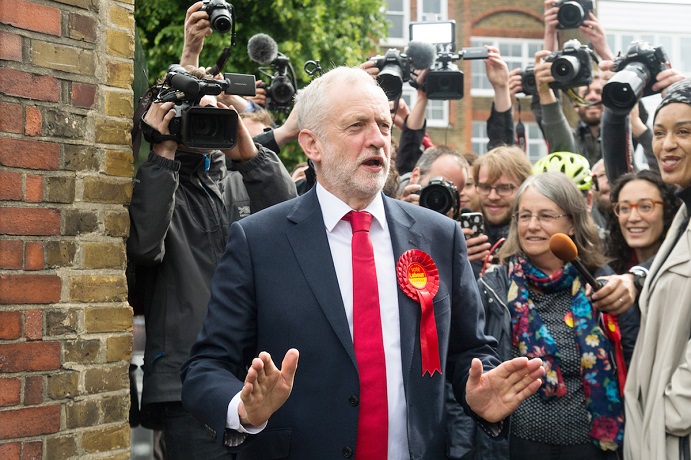Middle East Monitor / December 16, 2019
There’s no getting away from the fact that last Thursday’s General Election was a disaster for the left in Britain. Jeremy Corbyn’s Labour Party lost almost as many seats as it did in the calamitous 1983 election.
Labour’s leader at the time was Michael Foot, who, like Corbyn, was also smeared and demonised relentlessly by Britain’s woeful corporate media. In a similarly fateful poll, Labour lost 60 seats, while its vote share dropped to 28 per cent of the electorate.
With all the votes counted last week, Corbyn’s party had lost 59 seats, and its vote share had dropped to 32 per cent of the electorate, down almost 8 percentage points compared to the previous election in 2017. So many Labour MPs lost their seats in disenchanted northern post-industrial areas that even good socialists like Laura Pidcock and Dennis Skinner were turfed out by the blue wave of Tory voters.
Labour now has only 203 MPs at Westminster. One has to look back as far as 1935 to find a lower number of the party’s lawmakers in parliament, when Clement Atlee led Labour as it won just 154 seats in the House of Commons. Astonishingly, that was actually an increase of 102. Labour had been in a period of reconstruction after the betrayal of Ramsey McDonald in the great schism that resulted in “National Labour”.
In the early 1980s, Michael Foot also had to deal with being undermined by social-imperialist liberals. The short-lived Social Democratic Party ultimately failed in its project to establish a new force in British politics, but it did manage to hobble Labour’s chances before merging into the Liberals, resulting in the Liberal Democratic Party that we know today.
History repeated itself between 2015 and 2019, with right-wing Labour MPs implacably opposed to Corbyn from the start of his time as party leader. They sabotaged the party ruthlessly from within, fighting a rearguard action as they left. In February this year, that resulted in several of them starting a new party called the Independent Group. These disaffected right-wing MPs joined with several Tory MPs disenchanted with the ruling Conservative Party’s increasingly pro-Brexit direction.
One of the group’s financial backers was David Garrad, a high profile funder of the pro-Israel, anti-Palestine lobby, who was for years linked to Labour Friends of Israel. A majority of the Independent Group’s defecting MPs were official “Friends of Israel”.
Nevertheless, this group failed even more miserably than the SDP did in the 1980s. Collapsing into bitter infighting, some of its members joined the Liberal Democrats, including Chuka Umunna and Luciana Berger. One of the few silver linings of Thursday’s election was that every single one of these wreckers failed to get elected.
What a contrast, then, to 2017, when there was such hope for change. Although Corbyn did not win that election outright, the hung parliament was a stunning victory nonetheless. The 10 per cent increase in the vote share for his popular socialist policies defied all mainstream expectations. It was even a greater increase than that of the post-World War Two Labour government landslide of 1945.
Why? Because Corbyn and the popular movement behind him broke decisively with the poisonous legacy of Tony Blair’s bogus “New Labour”, which was shorthand for back-door privatisation at home and wars of aggression and neo-colonialism abroad.
While the issue of Brexit was decisive in this election, another important factor was the successful campaign to smear and defame Corbyn as an anti-Semite. This campaign started in 2015, even before he was elected party leader by a massive majority of the Labour membership. From the 2017 General Election, though, the smear campaign was ramped up massively. It never relented, because his enemies were implacable and ruthless.
In this election, the smears broke through to the wider electorate for the first time. Some people were duped into believing that Corbyn was an anti-Jewish racist. Polling data and anecdotal evidence from Labour canvassers confirm this.
The “Corbyn is an anti-Semite” lie was believed because it fits into a wider dishonest narrative about the Labour leader being an extremist who hates Britain and the British way of life (whatever that nebulous phrase is supposed to mean). However, that wasn’t the whole picture.
A poll commissioned by the anti-Corbyn, anti-Palestinian publication the Jewish News revealed earlier this year that 52 per cent of Labour voters agreed with the statement that “Jeremy Corbyn is the target of a concerted smear campaign by his political opponents to try to discredit him over anti-Semitism.” This suggested that, even after four years of relentless defamation, millions of ordinary working class Labour voters were not fooled by the anti-Corbyn propaganda.
Instead of taking advantage of this window of opportunity, though, Corbyn folded under the pressure. Instead of fighting back strongly against the smears, he bowed to right-wing demands and started to claim that Labour, uniquely, has some sort of “problem” with anti-Semitism. Labour activists who called the smears what they were — vicious smears — were punished. Some were pushed out of the party, like Ken Livingstone and Chris Williamson.
In many ways, Corbyn was in an impossible position, but defeat was not inevitable. As such, the left in Britain must learn that you cannot compromise with such a smear campaign. It must be defeated by fighting it head on.
Corbyn’s defeat will not be enough for the right-wing and Labour’s own pro-Israel lobby. They will pile on the pressure to purge the party of anyone remotely sympathetic to the Palestinians, as demanded by the Jewish Labour Movement and Labour Friends of Israel. Neither group is entirely independent of Israel itself; a hostile foreign power appears, therefore, to be having a substantial influence on British politics. Anyone genuinely interested in preserving what little remains of Britain’s democratic integrity must surely be concerned about that.
Asa Winstanley is an investigative journalist living in London who writes about Palestine and the Middle East













